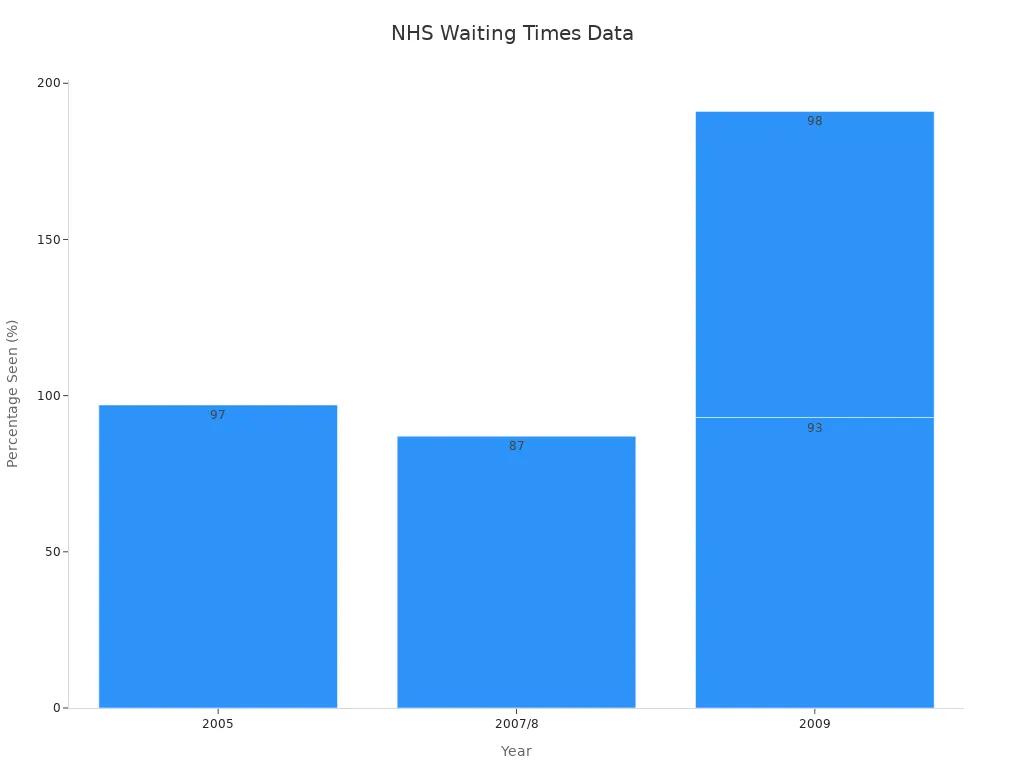Understanding the Consequences of NHS Waiting Times

NHS waiting times cause more than just inconvenience; the consequences extend far beyond mere delays. Prolonged waits in care can significantly deteriorate patients' health. For instance, extended waits in A&E can result in an alarming 14,000 additional deaths each year. Patients who are left waiting over 18 weeks for treatment frequently require more intensive care, with some needing as many as 17 extra prescriptions annually. These delays not only strain healthcare services but also incur higher costs and diminish the efficiency of services. Addressing these NHS waiting times consequences is crucial for improving care quality and restoring trust in the NHS.
Key Takeaways
NHS waiting times can cause serious health problems, like higher death rates and needing more care.
Waiting too long for treatment can harm mental health, causing stress and worry for patients.
Delays in care can make life harder, causing pain and less movement while waiting for surgeries.
Fixing NHS waiting times needs more money, better systems, and using technology to work faster.
Shorter waiting times can make patients happier, improve health, and ease pressure on public services.
What Are NHS Waiting Times and Why Do They Matter?
Definition and Scope of NHS Waiting Times
NHS waiting times mean how long patients wait for care. This starts when a doctor refers them and ends when treatment begins. Health officials track waiting times using different measures. For example, "queue size" counts how many patients are waiting. "Waiting time" shows how long each patient waits. Other ideas like "demand" and "capacity" check if the system meets patient needs. The NHS also uses "queueing theory" to study and improve waiting lists.
Metric/Concept | What It Means |
|---|---|
Queue Size | How many patients are waiting for care at one time. |
Waiting Time | How long a patient waits before getting treated. |
Demand | How many patients need care. |
Capacity | The most patients the NHS can treat in a set time. |
Queueing Theory | A way to study and fix waiting lists using maths. |
Current Trends and Statistics
NHS waiting times are now the longest they have ever been. In March, over 6.4 million people waited for routine care. This equals one in nine people in England. Patients waiting over two years for hospital care have risen six times since April 2021. Efforts reduced this number from 23,281 in February to 16,796 in March. But overall, the problem is still serious. Budget cuts, staff shortages, and COVID-19 have made delays worse.

Key Factors Driving Longer Waiting Times
Many problems cause longer NHS waiting times. One big issue is not enough staff. There are over 121,000 job openings in the NHS. These include nurses, maternity workers, and mental health staff. High staff turnover and hiring problems make things worse. Current staff feel overworked and stressed. Limited funding also stops the NHS from treating more patients. These problems make waits longer and care quality lower.
NHS Waiting Times Consequences for Patients
Health Worsening and Delayed Diagnoses
Long NHS waits can make your health worse. Delays in treating serious illnesses often lead to bad outcomes. For example, waiting too long for surgery or tests can cause problems needing extra care. Stress and worry during the wait also harm your health.
Patients often face issues with paperwork that make delays worse. Many have to chase test results or ask about their treatment plans. Some even get appointment letters after the date has passed, leaving them confused. These problems lower patient happiness and raise healthcare costs.
Delayed care causes more hospital visits due to problems.
32% of patients must follow up on test results.
23% feel unsure who to contact while waiting.
These problems show why quick healthcare access is important. Fixing delays can improve health and ease NHS pressure.
Mental Health Struggles and Emotional Stress
Long waits don’t just hurt your body; they affect your mind too. Many people feel worried, stressed, or sad while waiting for care. Not knowing what will happen adds to the emotional strain, making daily life harder.
Some patients face serious mental health crises or even suicidal thoughts due to delays. For those waiting for adult mental health care, the average wait is a shocking 727 days. This long wait can make mental health worse, forcing some to miss work or seek emergency help.
Evidence Description | Statistic |
|---|---|
People reporting worse mental health while waiting | |
People missing work due to poor mental health | 33% |
Average wait for adult mental health care | 727 days |
Average wait for planned care | 315 days |
These numbers show the need to fix NHS waiting times. Shorter waits can ease emotional stress and improve lives.
Higher Death Risks and Lower Quality of Life
Long waits for care can be life-threatening. Delays in treating illnesses like cancer or heart disease can cause serious harm.
Waiting too long also lowers your quality of life. Patients may suffer pain, trouble moving, or worse symptoms while waiting for surgeries like hip replacements. These problems affect your health, work, and social life.
Studies show long waits reduce quality-adjusted life-years (QALYs). For heart bypass surgery, QALY loss ranges from 0.034 to 0.043. For hip replacements, the loss is bigger, from 0.193 to 0.291. These facts show why quick treatment is vital to protect health and happiness.
By solving NHS waiting time issues, healthcare can save lives and improve care for many people.
Societal and Economic Impacts of NHS Waiting Times Consequences
Pressure on Public Services and Resources
NHS waiting times affect more than just patients. They put huge pressure on public services. Delays in care make hospitals and clinics busier. This leads to crowded spaces, longer lines, and tired staff. A&E departments often work at full capacity. This leaves patients and workers feeling upset and stressed.
"Longer waiting times are caused by the NHS's money problems. This is worrying. Patients suffer, and treatments may not work as well. Hospitals also lose money because of these pressures."
"These numbers show what we already know – A&E departments are always full. Patients and hardworking staff are being let down by a system in trouble."
These problems show why fixing waiting times is so important. By using resources better, the NHS can ease the load on public services and improve care.
Costs, Job Losses, and Lower Productivity
NHS waiting times also hurt the economy. Long waits can make illnesses worse, stopping people from working. This lowers their income and reduces the country's productivity. A report in May 2024 showed productivity dropped by 11% since COVID-19. The average wait for hospital care rose from 8 to 15 weeks. Now, 7.7 million people are waiting for NHS treatment.
The NHS itself faces money problems too. The National Audit Office found a £1.4 billion deficit, partly due to lower productivity. These issues affect businesses, families, and communities. To fix this, the NHS must work on reducing waiting times and improving efficiency.
More People Turning to Private Healthcare
As NHS waits grow, many choose private healthcare instead. This creates a system where richer people get faster care. Others, who cannot afford private treatment, face longer waits. Studies show private patients often wait longer for NHS specialist care. Wealthier people also tend to have shorter waits overall.
This shift to private care increases inequality. It also adds pressure to the NHS. Private patients may return to the NHS when waits improve. If NHS capacity does not grow, waiting lists will keep increasing. This could lead to worse health, loneliness, and higher costs.
Long waits can make patients lose independence.
Untreated health problems increase social isolation.
Economic issues like job loss and slower growth may follow.
To solve these problems, the NHS must cut waiting times and ensure fair access to care for everyone.
Personal Stories Showing NHS Waiting Times Effects
Patients’ Struggles with Delayed Care
It’s hard to imagine how tough waiting for care can be. Many patients suffer from worsening pain while they wait. One patient said, "I’m in constant pain. My arthritis and joint pain are unbearable." Others find it hard to do simple tasks. One person shared, "It’s limiting. Just walking here for this interview takes days to recover."
The emotional impact is just as serious. Patients often depend on family and friends for help. This can put pressure on relationships. These examples show how delays harm both physical health and emotional well-being.
NHS Staff Facing Daily Challenges
Have you thought about how NHS staff handle these issues? Many feel powerless because of system problems. These problems stop them from giving clear updates to patients. Staff also deal with overcrowded A&E departments and slow patient discharges.
It’s even harder to manage patients when there aren’t enough beds or operating rooms. These struggles show the bigger problems within the NHS. Despite this, staff work hard every day to care for patients.
Families and Communities Feeling the Strain
Long NHS waits don’t just hurt patients; they affect families too. A survey by Engage Britain found 39% of people felt stressed or upset due to NHS delays. Worries about GP appointments affected 30%, and 23% were anxious about hospital waits.
One story is about Allie, a 33-year-old from Sheffield. She waited months for endometriosis care, which caused her anxiety and depression. Miriam Levin from Engage Britain said many people feel lost and unsure during these waits. This stress spreads to families and communities, causing frustration and sadness.
"How long people are willing to wait depends on things like how important the visit feels and the cost of waiting. These factors shape their experience of delays."
These stories show why fixing NHS waiting times is so important. Shorter waits can bring hope and improve life for everyone.
Addressing NHS Waiting Times Consequences: Possible Solutions
Adding More Money and Resources to the NHS
Giving the NHS more money and resources can cut waiting times. Over the years, more people have needed NHS care. For example, waiting lists in England grew from 4.6 million in December 2019 to 7.5 million by November 2024. This shows the urgent need for extra resources to help patients. The UK Government has started plans like Reforming Elective Care for Patients. This plan uses private hospitals to reduce pressure on NHS services.
Studies show private hospitals treated more patients without slowing NHS work. This means adding funds to increase treatment spaces helps everyone. With more resources, the NHS can fix delays and give better care.
Making NHS Processes Simpler
Simpler NHS systems can also shorten waiting times. Complicated steps often slow down patient care. One helpful idea is the Specific Timely Appointments for Triage (STAT) model. This plan creates special appointments based on patient needs. It also clears old waiting lists with a one-time action.
"The STAT model removes tricky prioritisation steps. It ensures patients are seen quickly."
Using such ideas can improve how patients move through the system. It also cuts down on paperwork delays. Easier processes save time and make patients happier.
Using Technology to Work Faster
Technology can help the NHS work better and faster. Tools like digital health records and AI can speed up care. Research shows some key points for using technology well:
Key Findings | How It Helps NHS Work Better |
|---|---|
Improves how new health tools are chosen. | |
Support from clinical leaders | Helps bring in new diagnostic tools. |
Decisions based on evidence | Ensures technology improves patient care. |
Worries about costs | Shows the need for realistic money goals. |
Changing work habits | Needed to use new tools effectively. |
These points show technology can change NHS services if used wisely. By trying new tools, the NHS can cut waiting times and give better care to patients like you.
NHS waiting times cause more than just inconvenience. They affect patients, healthcare, and society. Delays make people anxious, unhappy, and increase costs. Studies show the 4-hour A&E target helps patient flow but may harm care quality. Adding resources for urgent cases like cancer can shorten waits and improve results. Fixing delays with more funding, better plans, and new technology can improve care. It will also ease pressure on society and help people trust the NHS again.
FAQ
What are NHS waiting times?
NHS waiting times mean how long you wait for care. This starts when a doctor refers you and ends when treatment begins. It includes surgeries, tests, or other care. The NHS checks these times to see how well services work and how easy it is for patients to get help.
Why do NHS waiting times matter?
Long waits can make your health worse and delay finding problems. They also cause stress and put pressure on public services. These delays hurt the economy too. Fixing them helps people stay healthier and makes the NHS work better.
How do waiting times affect mental health?
Waiting too long can make you feel worried or sad. Many people feel unsure about their health, which makes life harder. For mental health care, some wait over two years. This can make problems worse and lead to needing emergency help.
Can private healthcare reduce waiting times?
Private healthcare gives faster care if you can pay for it. But this is unfair for those who cannot afford it. More people using private care can also add pressure to the NHS when they return for follow-ups.
What can you do while waiting for NHS treatment?
You can stay healthy by eating well and managing stress. Keep in touch with your doctor and ask for updates. Joining support groups or talking to a counsellor can also help you feel better while you wait.
See Also
How NHS Waiting Times Affect Patient Health And Happiness
A Guide To NHS Waiting Times And Their Computation
New Developments In NHS Waiting Times And Healthcare Effects

